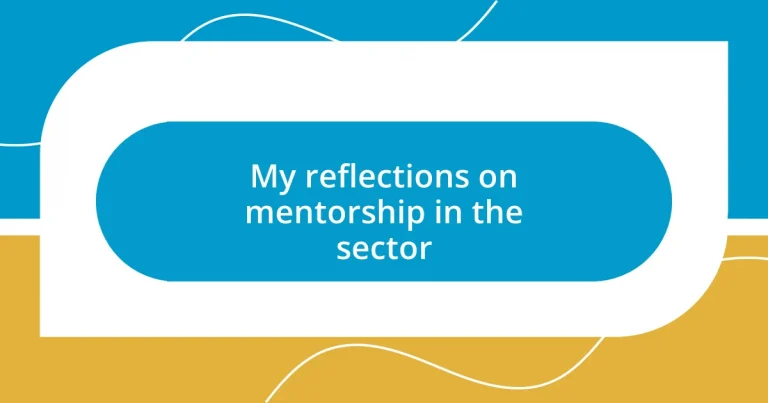Key takeaways:
- Effective mentorship fosters personal and professional growth through support, skill development, and emotional encouragement.
- Building a productive mentoring relationship relies on trust, open communication, and setting clear expectations for mutual benefit.
- Measuring mentorship impact extends beyond metrics; personal reflections and long-term relationships reveal deeper significance and transformation.
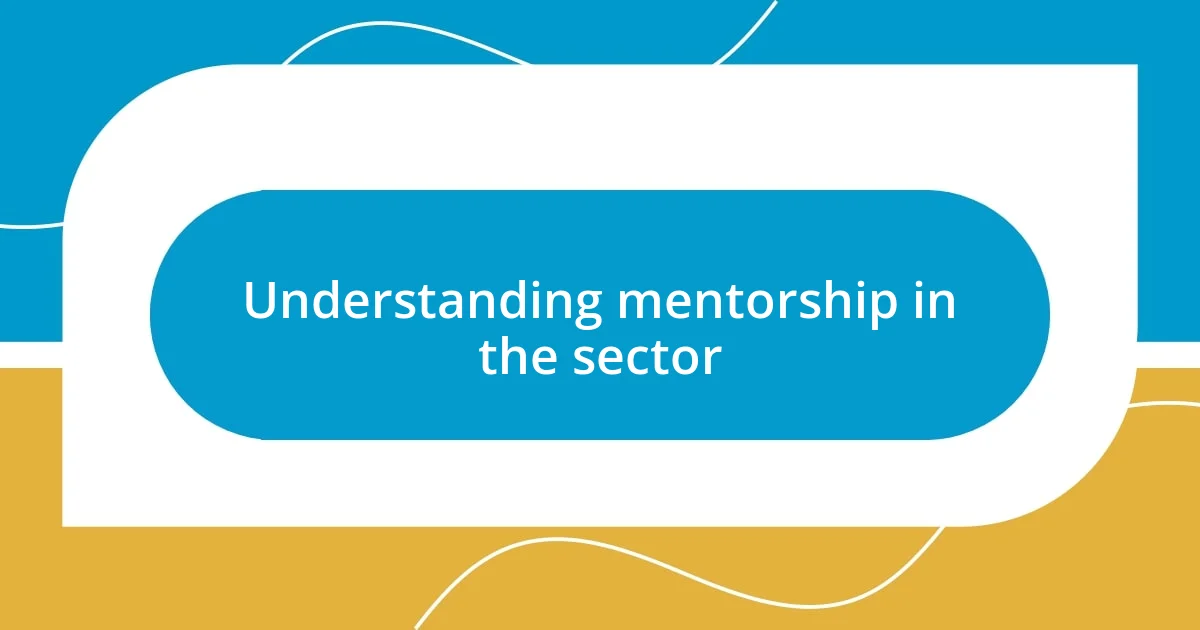
Understanding mentorship in the sector
Mentorship in the sector is a powerful tool that fosters growth, both personally and professionally. I remember my first mentorship experience vividly; my mentor not only shared their expertise but also encouraged me to step outside my comfort zone. It made me wonder—how much further could I have advanced without that push?
In my view, effective mentorship cultivates a space where vulnerabilities are embraced, and growth is prioritized. I once had a mentee who struggled with self-doubt, and just offering a listening ear supported their transformation. Isn’t it amazing how sometimes, simply being there can spark a profound change in someone’s journey?
Moreover, mentorship is not just about sharing knowledge; it’s also about building relationships that can last a lifetime. I cherish the connection I formed with my mentor, who became a lifelong friend. Have you ever considered how a single conversation could alter your career path? It’s moments like these that highlight mentorship’s true value in the sector.
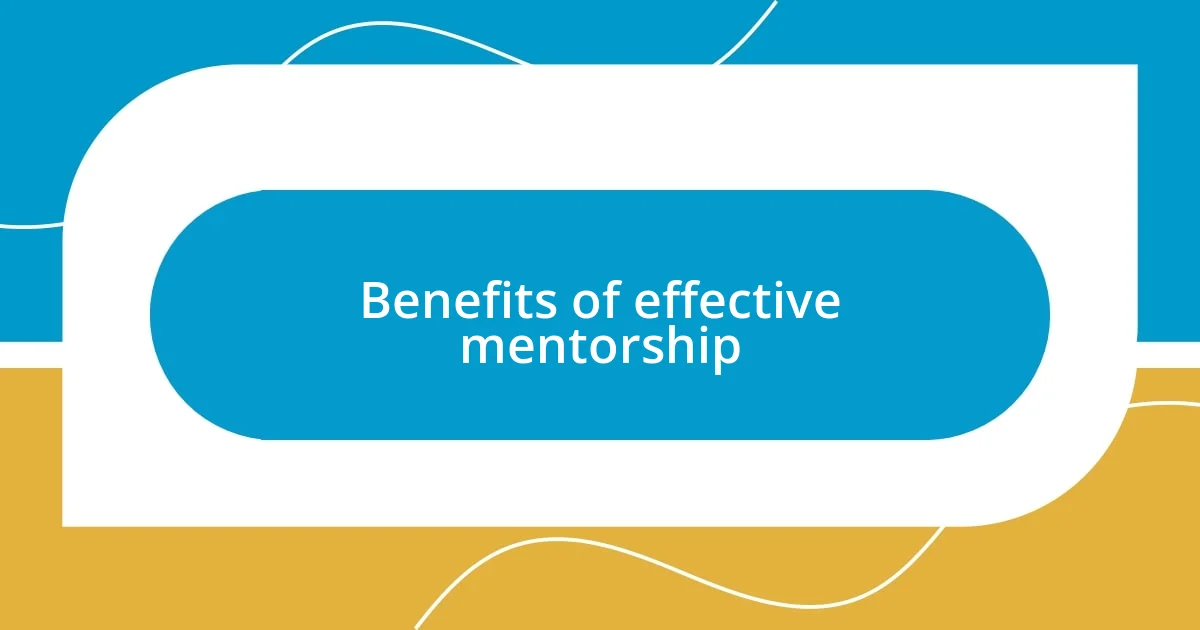
Benefits of effective mentorship
Effective mentorship brings a wealth of benefits, both for the mentee and the mentor. From my own experience, I’ve seen mentees blossom into confident leaders under the right guidance. There’s something powerful about knowing someone believes in your potential; it can ignite a spark of motivation that’s hard to extinguish.
Here are some significant benefits of effective mentorship:
- Skill Development: Mentors help mentees refine their skill set and gain practical insights.
- Network Expansion: Mentorship often opens doors to new connections, enhancing professional networks.
- Emotional Support: I can recall times when my mentors offered reassuring words during challenging projects, which made all the difference.
- Personal Growth: Mentees are encouraged to step outside their comfort zones, leading to greater confidence and resilience.
- Feedback: Constructive criticism from a mentor can guide mentees on their journey, offering invaluable perspectives.
In a memorable instance, a mentee of mine was grappling with public speaking. With my support, not only did they conquer that fear, but they also emerged as a confident presenter. Witnessing their growth not only warmed my heart but reinforced the idea that mentorship truly fosters both personal and professional evolution.
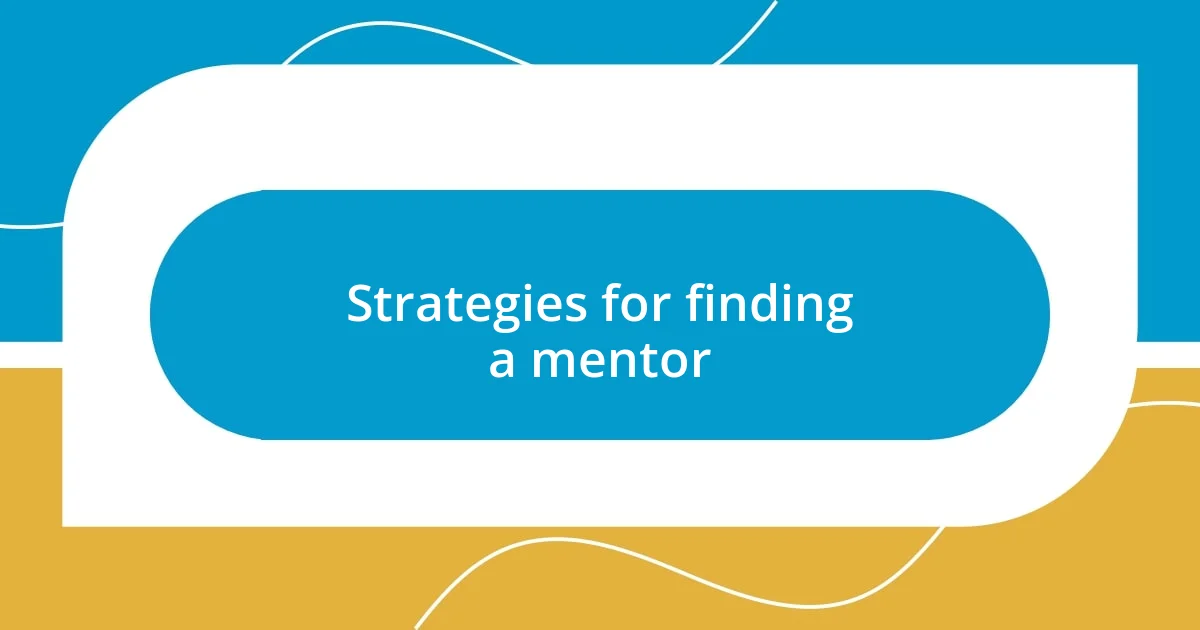
Strategies for finding a mentor
To find a mentor, you need to approach your search with intention and openness. One effective strategy is to identify people in your field whose work you admire. I remember when I admired a senior colleague’s project that seemingly changed the course of our team’s direction. It felt daunting to reach out initially, but when I did, it opened up doors I would never have considered otherwise. Sometimes, all it takes is that first step—don’t underestimate the power of simply asking.
Another method involves networking through professional organizations or events. I’ve had success attending conferences where I’ve not only learned but have also met potential mentors. It’s amazing how engaging in conversations about shared interests can lead to deeper connections. Have you ever struck up a conversation based on a simple question? I’ve found that these organic dialogues often lead to meaningful relationships with experienced professionals who are eager to guide.
Lastly, don’t overlook the potential of online platforms. Social media and professional networking sites can be superb tools for finding mentors. I recently joined a group focused on my industry, and the engagement was incredible! I reached out to someone whose insights resonated with me, and we scheduled a virtual coffee chat that became a transformative experience. This approach blends convenience with the opportunity to connect with people you may never meet in person.
| Strategies | Details |
|---|---|
| Identify Admired Colleagues | Reach out to those whose work inspires you; it may lead to mentorship opportunities. |
| Network at Events | Engage in conversations at conferences or workshops to build relationships. |
| Utilize Online Platforms | Connect through social media for virtual introductions and mentorship dialogues. |
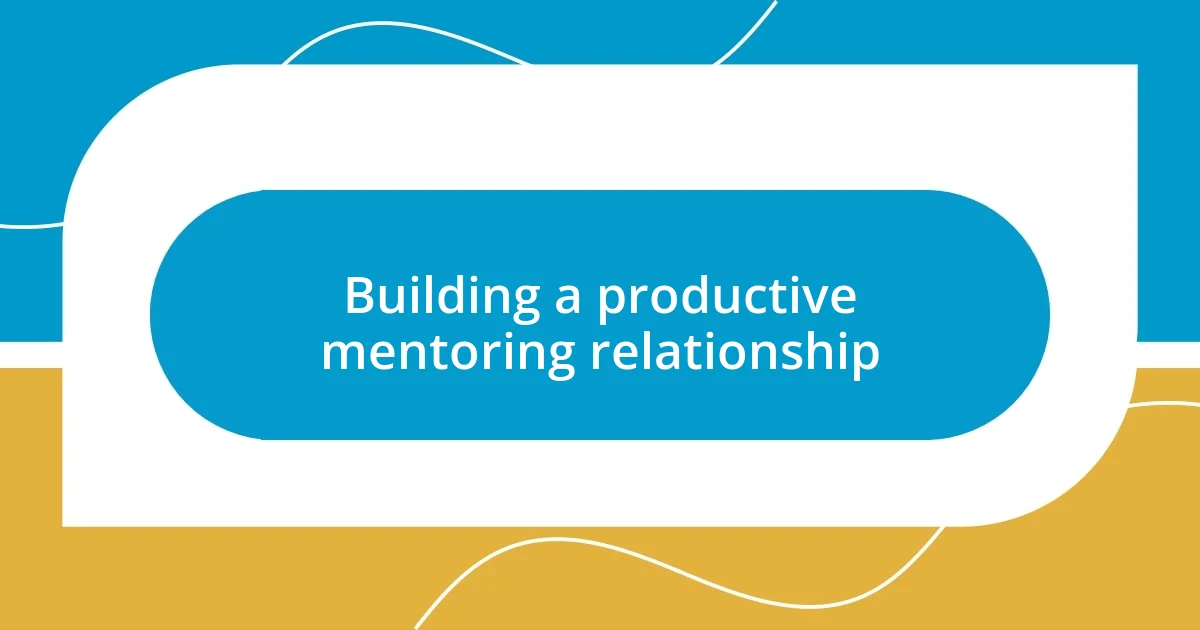
Building a productive mentoring relationship
Building a productive mentoring relationship is all about establishing trust and open communication. I remember the early days of my mentoring journey, where my first mentee and I spent time sharing not just professional goals but personal aspirations too. This level of transparency created a safe space for candid discussions about challenges we faced, enabling us to work through obstacles together. Have you ever felt more motivated when someone truly understood your journey?
Setting clear expectations is another critical component. In one instance, I worked with a mentee who struggled to manage time effectively. By outlining our goals and timelines, we could pinpoint areas for improvement and celebrate small victories along the way. This purposeful structure allowed us to track progress and maintained accountability, which I found incredibly empowering.
Lastly, I believe that feedback is a two-way street in a mentoring relationship. I encourages open dialogues where my mentees can voice their thoughts on my mentoring style. Once, a mentee pointed out that our discussions felt too rigid. By adapting our approach to be more casual, we connected better, turning our sessions from simple check-ins into engaging brainstorming conversations. Isn’t it fascinating how a small change can elevate the entire experience?
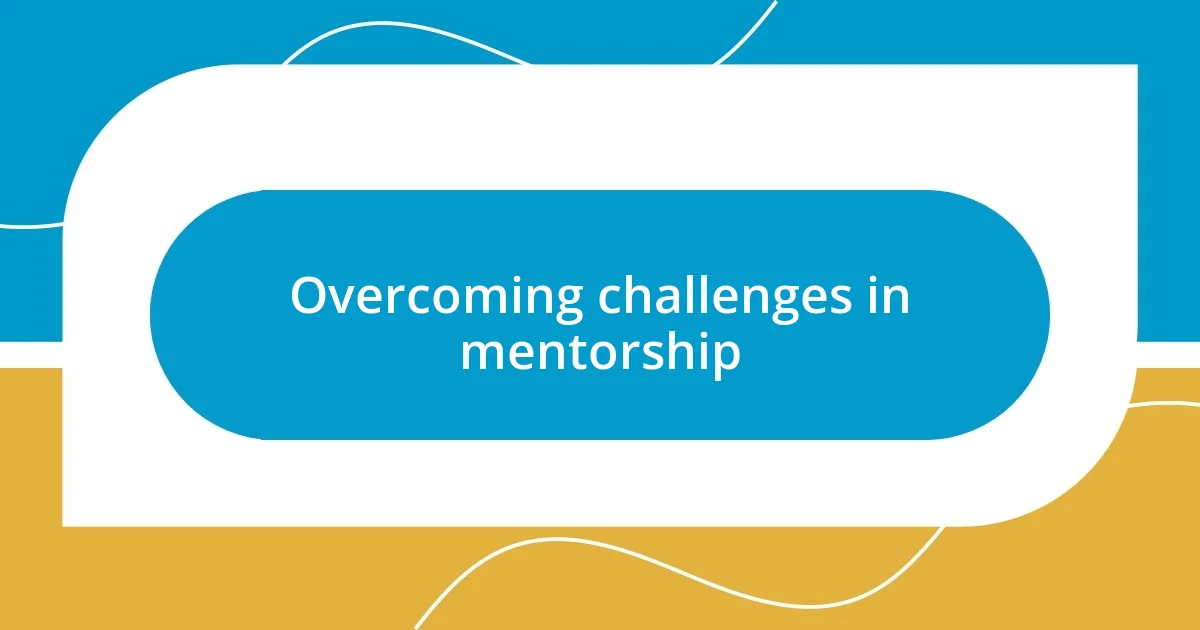
Overcoming challenges in mentorship
Facing challenges in mentorship is an inherent part of the journey, but I’ve learned that communication is key. I remember a time when I struggled to connect with a mentee who seemed reluctant to share their concerns. After several sessions of awkward silence, I decided to ask directly, “What’s holding you back?” The relief in their eyes as they opened up was palpable, and it transformed our relationship. Have you ever experienced a similar breakthrough moment? It truly emphasizes how a simple question can dismantle barriers.
Another challenge I often encounter is managing different expectations. Once, I had a mentee who envisioned mentorship as simply receiving advice, while I saw it as a collaborative relationship. We spent some time discussing our differing perspectives, which led to a much richer exchange of ideas than I had anticipated. I found that aligning our visions brought us closer together and deepened our understanding of one another. Have you ever aligned your expectations with someone else’s, only to find that the experience became far more rewarding?
Lastly, the emotional ups and downs can be draining for both parties. I recall a particularly tough period where my mentee faced significant setbacks at work. It was hard to see them struggle, but it was during those moments of vulnerability that our bond truly strengthened. I made it a point to be present and supportive, offering a listening ear rather than jumping straight to solutions. It taught me that sometimes, just being there is the most powerful way to uplift someone. Isn’t it interesting how vulnerability can foster resilience in a mentorship?
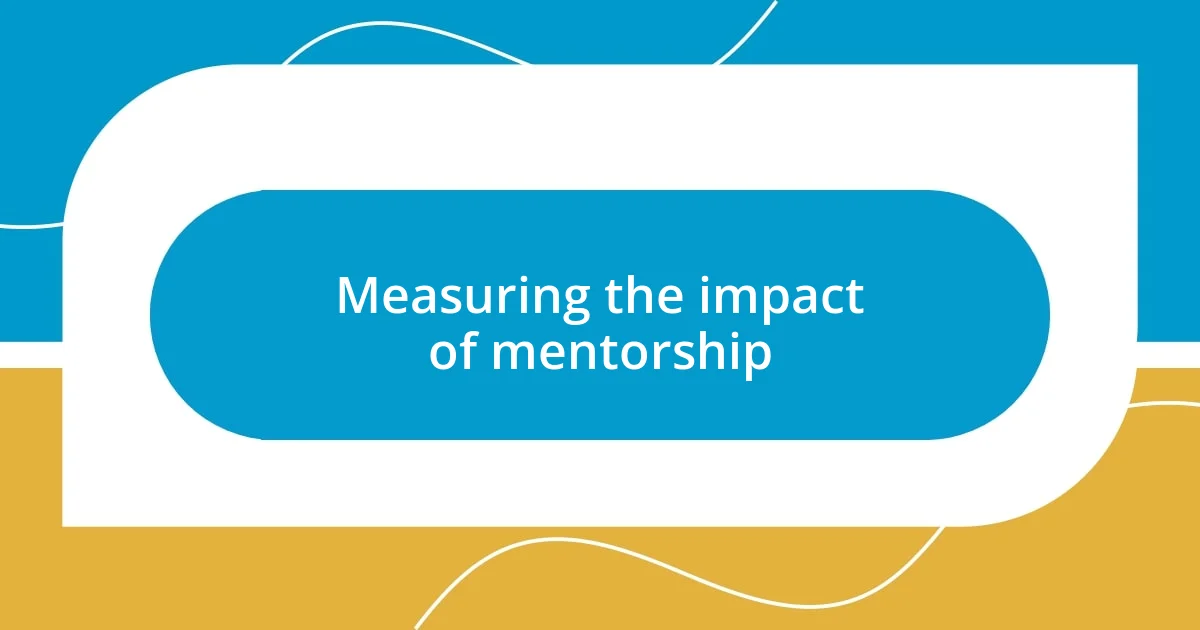
Measuring the impact of mentorship
Measuring the impact of mentorship goes beyond mere statistics; it encompasses the emotional growth and professional development experienced by both parties. I can recall a time when a mentee shared her newfound confidence in leading presentations. This shift wasn’t just about improved skills; it reflected her evolving self-image, an invaluable outcome of our mentoring relationship. How do you capture that essence when evaluating impact?
Survey and feedback mechanisms can help quantify changes, but I believe reflection plays a crucial role too. After concluding a mentoring cycle, I often ask mentees to reflect on their journey and identify which moments resonated with them the most. One mentee mentioned how our discussions about work-life balance helped her reframe her priorities. Such revelations are more than statistics; they’re markers of significant personal evolution, right?
Lastly, I find that long-term relationships are an excellent indicator of mentorship’s impact. For instance, one former mentee now seeks my input as a peer and even offers to mentor others herself. This cycle of giving back highlights a deeper level of success than numbers can convey. Isn’t it inspiring to see mentoring come full circle, creating a ripple effect in the community?












